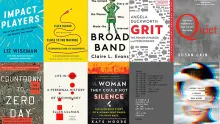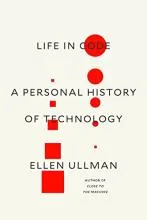
10 must-read books written by women in tech
Blog: The Enterprise Project - Enterprise Technology

Book description (via Amazon): “The last twenty years have brought us the rise of the internet, the development of artificial intelligence, the ubiquity of once unimaginably powerful computers, and the thorough transformation of our economy and society. Through it all, Ellen Ullman lived and worked inside that rising culture of technology, and in Life in Code she tells the continuing story of the changes it wrought with a unique, expert perspective.”
Why you should read it: “I loved reading Ellen Ullman’s Life in Code: A Personal History of Technology,” claims Arshia Khan, Product/UI Designer at SPR. “She’s an eloquent writer who offers compelling insights into digital culture. Her thoughts on gender relations and navigating the early beginnings of tech as a woman are familiar with what that space feels like today. And her philosophical musings on robotics and artificial intelligence are particularly relevant to our time. A brilliant read for those in the tech world or anyone interested in the history of technology.”

Book description (via Amazon): “Part coming-of-age-story, part portrait of an already-bygone era, Anna Wiener’s memoir is a rare first-person glimpse into high-flying, reckless startup culture at a time of unchecked ambition, unregulated surveillance, wild fortune, and accelerating political power. With wit, candor, and heart, Anna deftly charts the tech industry’s shift from self-appointed world savior to democracy-endangering liability, alongside a personal narrative of aspiration, ambivalence, and disillusionment.”
Why you should read it: Dr. Rhiannon Little-Surowski, CEO at Brain Jar, notes, “it’s the biography of the author’s rise through the ranks of a Silicon Valley tech startup. I think it’s an especially good pick because it shows the problems that arise from having a male-dominated workforce, but delivered in an enjoyable first-person story. The author is put in uncomfortable situations repeatedly, actions of male coworkers are excused by more male coworkers, and the overall climate of her company caters to western men. Business meetings in bars were normal, for example. They would have made a Muslim coworker uncomfortable, in addition to making the female coworkers feel they had to keep their guard up around tipsy male coworkers. Aside from the problems it uncovers, it also shows how a strong woman who can think on her toes can rise through the ranks at tech companies to make a difference. For woman readers, I hope her story will inspire them. For male readers, I hope it will help them see the tech world from another perspective, a woman’s perspective.”
A People’s History of Computing in the United States

Book description (via Amazon): “The invention of the personal computer liberated users from corporate mainframes and brought computing into homes. But throughout the 1960s and 1970s a diverse group of teachers and students working together on academic computing systems conducted many of the activities we now recognize as personal and social computing. Their networks were centered in New Hampshire, Minnesota, and Illinois, but they connected far-flung users. Joy Rankin draws on detailed records to explore how users exchanged messages, programmed music and poems, fostered communities, and developed computer games like The Oregon Trail. These unsung pioneers helped shape our digital world, just as much as the inventors, garage hobbyists, and eccentric billionaires of Palo Alto.”
Why you should read it: “One of the best books on the early days of computing, well before the current age of the internet, claims Courtney Hemphill, partner, product experience & engineering lab at West Monroe, was written by Dr. Joy Lisi Rankin, who now leads the research program in Gender, Race, and Power in Artificial Intelligence (AI) at the AI Now Institute at New York University. This book explores how even in the earliest days of computing, we invented novel ways to connect as humans.”
The Woman They Could Not Silence

Book description (via Amazon): “Bestselling author Kate Moore brings her sparkling narrative voice to The Woman They Could Not Silence, an unputdownable story of the forgotten woman who courageously fought for her own freedom—and in so doing freed millions more. Elizabeth’s refusal to be silenced and her ceaseless quest for justice not only challenged the medical science of the day, and led to a giant leap forward in human rights, it also showcased the most salutary lesson: sometimes, the greatest heroes we have are those inside ourselves.”
Why you should read it: Julie Furt, SVP of Global Services & Support at Talend, shares, “Much of my focus in my professional reading is around how to best operate in different environments and outside of your comfort zone. I am a big fan of Kate Moore. In particular, her book, ‘The Woman They Could Not Silence,’ is about Elizabeth Packard, an unintentional mental health rights advocate. Kate does an amazing job of profiling historical figures who advocate for those without a voice and learn to make systems not designed for them succeed in their cause.”

Book description (via Amazon): “A top cybersecurity journalist tells the story behind the virus that sabotaged Iran’s nuclear efforts and shows how its existence has ushered in a new age of warfare—one in which a digital attack can have the same destructive capability as a megaton bomb."
Why you should read it: “I would highly recommend reading Countdown to Zero Day: Stuxnet and the Launch of the World’s First Digital Weapon by Kim Zetter, says Dr. Wendy H. Hayes, Director of Homeland Security Programs Camelot. Not only does Zetter make the story of the Stuxnet cyber attack against the uranium enrichment facilities in Iran an interesting read, but she does so with incredible detail and impressive documentation. Understanding technology is one thing; helping others to understand what you know is magic.”

Book description (via Amazon): “In Quiet, Susan Cain argues that we dramatically undervalue introverts and shows how much we lose in doing so. She charts the rise of the Extrovert Ideal throughout the twentieth century and explores how deeply it has come to permeate our culture. She also introduces us to successful introverts—from a witty, high-octane public speaker who recharges in solitude after his talks, to a record-breaking salesman who quietly taps into the power of questions. Passionately argued, impeccably researched, and filled with indelible stories of real people, Quiet has the power to permanently change how we see introverts and, equally important, how they see themselves. “
Why you should read it: Elif Tutuk, Global Head of Product at AtScale is "inspired by Susan Cain, the author of Quiet: The Power of Introverts, and loves how [the author] links introversion to leadership, creativity, and organizational transformation. Susan’s message about self-belief, confidence, and individuality speaks to me personally. Her work helps to change the labels we assign to people, allowing us all to embrace equity.”

Book description (via Amazon): “In Impact Players, New York Times bestselling author and researcher Liz Wiseman reveals the secrets of these stellar professionals who play the game at a higher level. Drawing on insights from leaders at top companies, Wiseman explains what the most influential players are doing differently, how small and seemingly insignificant differences in how we think and act can make an enormous impact, and why—with a little coaching—this mindset is available to everyone who wants to contribute at their highest level.”
Why you should read it: Mahkameh Yaghmaie, the Director of Engineering at Clio remarks, “I am far more interested in reading about leadership rather than the technology itself. This brilliant read provides an in-depth look at the critical team players in various industries and the common traits that set them apart. It delves deep into the personal qualities and traits that make great leaders. This book is sure to be a source of inspiration and motivation and will leave you feeling ready to take on whatever challenges come your way!”
Grit: The Power of Passion and Perseverance

Book description (via Amazon): “The daughter of a scientist who frequently noted her lack of “genius,” Angela Duckworth is now a celebrated researcher and professor. It was her early eye-opening stints in teaching, business consulting, and neuroscience that led to her hypothesis about what really drives success: not genius, but a unique combination of passion and long-term perseverance.”
Why you should read it: Ashley Kramer, Chief Marketing and Strategy Officer (CMSO) at GitLab rereads Angela Duckworth’s book every year and finds inspiration each time. “She talks about taking a job teaching seventh-grade math in a New York public school, and it was there that she had the epiphany that it wasn’t IQ that predicted success; it was grit. To me, grit means persevering despite things outside my control and carving out your own path or role when you don’t like the options in front of you. Multiple times in my life, I’ve grown frustrated by my circumstances – from not getting picked for the All-American soccer team because I was too small to not getting promoted because even though I had the expertise, I didn’t have a certain number of years of experience. These were all things out of my control, but grit kept me going."
Close to the Machine: Technophilia and Its Discontents

Book description (via Amazon): “In 1997, the computer was still a relatively new tool—a sleek and unforgiving machine that was beyond the grasp of most users. With intimate and unflinching detail, software engineer Ellen Ullman examines the strange ecstasy of being at the forefront of the predominantly male technological revolution, and the difficulty of translating the inherent messiness of human life into artful and efficient code. Close to the Machine is an elegant and revelatory mediation on the dawn of the digital era.”
Why you should read it: Kimberly Wiswell, CMSP-Fellow and Senior Product Manager, Workers’ Compensation at Gradient AI reveals, “Close to the Machine: Technophilia and Its Discontents by Ellen Ullman was one of the first books I read written by a woman in IT. Ellen made her career during the internet boom of the 1990s in an industry dominated by men. When I began my career in the late ‘70s, I was one of the only female students in my COBOL classes and managed a nine-month software app project with a team of all men; I sympathized with her plight. In 2018, I took a job in Silicon Valley, and while some things had changed, other gender equality issues had not improved. This is an interesting book for anyone seeking to enter the world of start-ups and VCs from an insider’s perspective – and just happens to be a woman author.”

Book description (via Amazon): “Join the ranks of the pioneers who defied social convention to become database poets, information-wranglers, hypertext dreamers, and glass ceiling-shattering dot com-era entrepreneurs. This inspiring call to action shines a light on the bright minds whom history forgot, and shows us how they will continue to shape our world in ways we can no longer ignore.”
Why you should read it: “While not written by a woman in the tech field, but about women in tech, Broad Band: The Untold Story of the Women Who Made the Internet by Claire L. Evans provides an in-depth view into the role of women in IT over the years, showing that it’s not a new phenomenon. "There have always been women who've played an integral role in IT; we just haven’t heard much about them,” observes Kimberly Wiswell of Gradient AI. “In addition to the early pioneers most of us are familiar with, such as Ada Lovelace, Grace Hopper, and Katherine Johnson, she delves into the more modern players in our technical world today.”
[ Learn the non-negotiable skills, technologies, and processes CIOs are leaning on to build resilience and agility in this HBR Analytic Services report: Pillars of resilient digital transformation: How CIOs are driving organizational agility. ]

